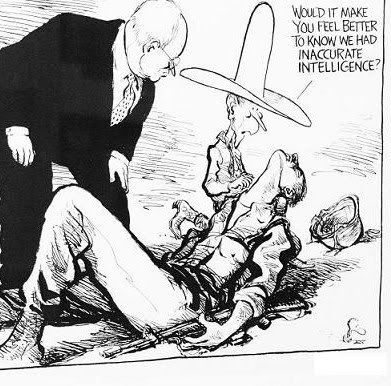
On March 20th, 2003 President George W. Bush went on national television to address the nation. He told the American people that Iraq had weapons of mass destruction, capable of threatening the United States. He offered Saddam Hussein an ultimatum - step down or face war.
48 hours later, amid protests and anger from the international community, the United States invaded Iraq. They barely put up a fight. And a few weeks later on May 1st, 2003, President Bush announced the end of major combat operations in Iraq.
Six years, $700 billion and 4,000 American lives later, we are still engaged in major combat operations in Iraq. We never did find those "weapons of mass destruction". And most importantly, evidence has come to light suggesting that the Bush administration mislead the country in it's attempts to start a war with Iraq in the first place.
In 2002 many months before the war began, George Tenet of the CIA insisted there was no connection between al-Qaeda and Iraq. In response, Dick Cheney and Donald Rumsfeld initiated a secret program to re-examine the evidence, this time excluding the CIA and Tenet. This new and controversial information was not analyzed and instead presented directly to the public. Many believe this move was pushed for by Vice President Cheney.
A month later, Tenet once again briefed the Bush administration. He presented information suggesting that Iraq did NOT have weapons of mass destruction. This information was dismissed and never shared with Congress.
Than in September 2002, the Bush administration claimed to have evidence suggesting Iraq was making an effort to create nuclear bombs. This analysis was opposed by the US Department of Energy, who are considered experts in gas centrifuges and nuclear weapons programs.
An effort by the department to correct Colin Powell's forthecoming address to the United Nations on the issue was rebuffed. Powell later admitted he had presented inaccurate data to the UN, and that the intelligence he was relying on was in some cases "deliberately misleading."
---
This information is eye opening and shocking to many. But let's be honest, people don't often connect well with raw information, complicated quotes and massive documents released years after an event took place. Sometimes you have to make things a little more simple to get through and make your point.
And that's what this cartoon is able to do. It translates that information to convey a message that might be considered inappropriate or unproffesional for a newspaper or newscast to report.
On that note, let's assume for a second that Dick Cheney was behind the Iraq War, and that he lead the country into this under false pretenses. And for fun, let's throw in the idea that President Bush is an incompetent puppet under the control of Dick Cheney. To many Americans, that probably seems direspectful and hard to believe. They were the President and Vice President after all.
And because of their former position, you probably won't hear statements like that from any conventional source of news.
But luckily for Oliphant, he is not restricted by the same rules and code of ethics that people in the journalism world are. He can be brutally honest and even interject his own opinion to make a point. It's one of the perks of being a cartoonist instead of a columnist.
And so, we see this cartoon openlyblaming Bush for bringing us into war with faulty intelligence. His quote makes him look irresponsible, immature and incapable of performing his job.
And then look at Dick Cheney. He looks angry, intimidating and shows no compassion for the result of his actions. And while viewers of this cartoon may or may not agree with the statement, they are thinking about it in the back of their minds. The idea that the Bush adminstration did not perform their jobs properly is being considered when anyone views this image.
Today things are better. We have a new administration. Security in Iraq has improved dramatically. And perhaps in the end, some good came out of this war. But we must never forget the lessons we learned in 2003. Trust our government, but use discretion and take everything with a grain of salt. Don't rush as a nation into important decisions with unknown repricussions.
And most importantly, remember the power we are granting a person or political party when we elect them into office.
And this cartoon does just that. It makes sure that we never forget the sacrifices made in the name of Operation Iraqi Freedom.
No comments:
Post a Comment